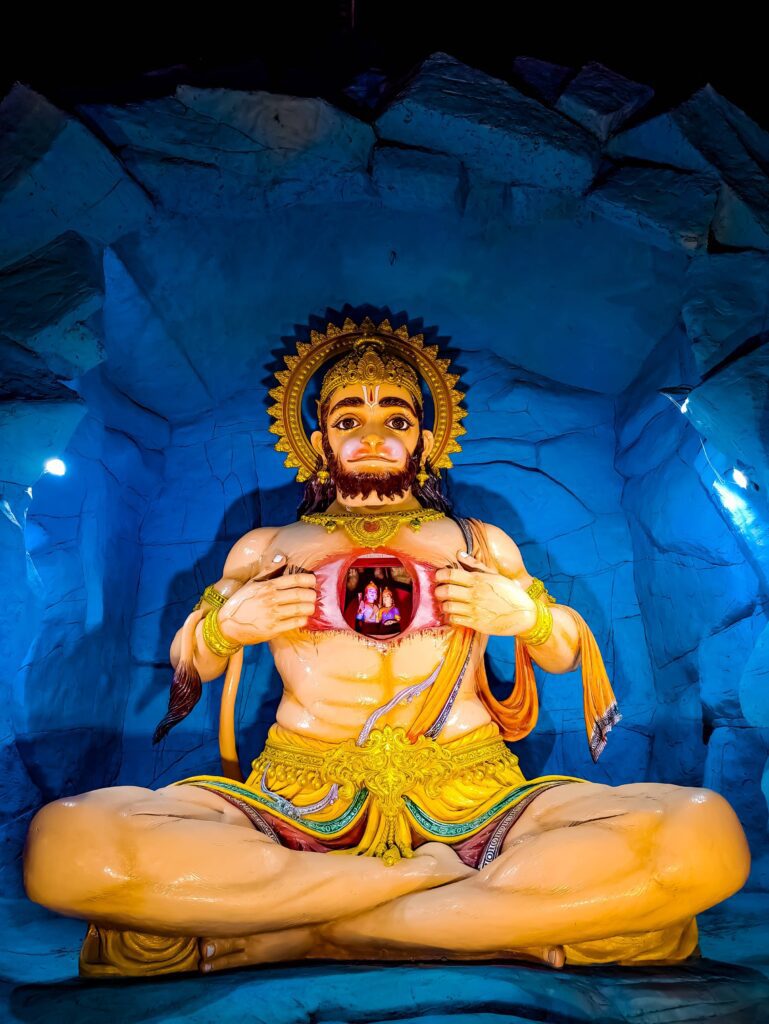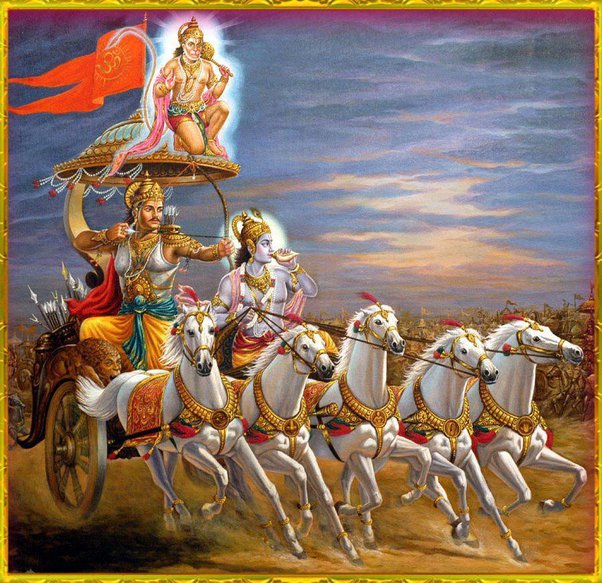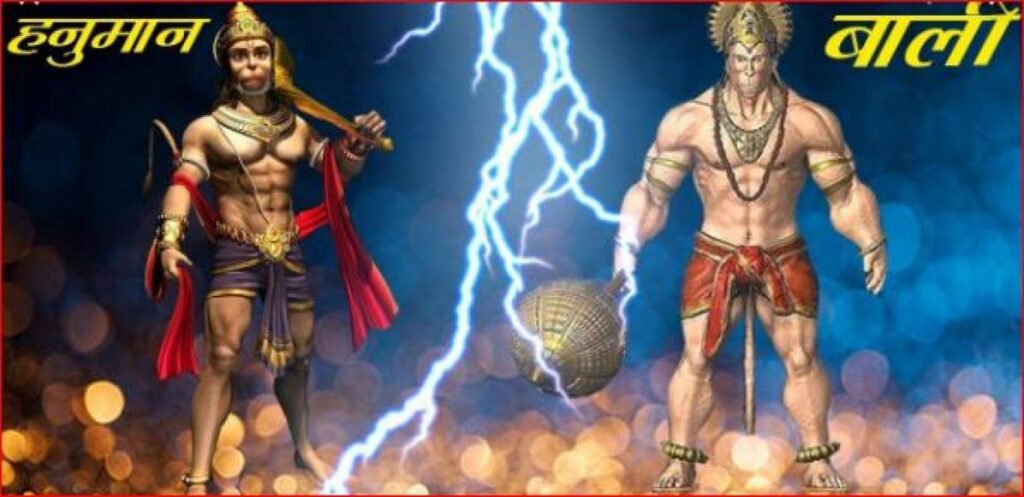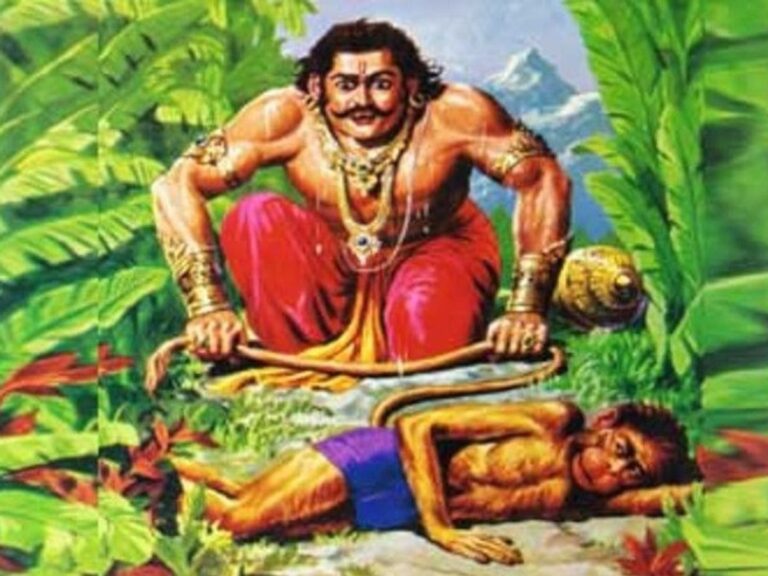Unknown facts about Mahavir Hanuman ji
1. Who is hanuman?
- The Son of the Wind: Imagine a child born of the wind itself, with the strength to move mountains and the agility to leap across oceans. Hanuman’s very birth is a testament to his extraordinary nature. He was born to Anjana and Kesari, two celestial beings, after they received a divine blessing from Lord Shiva and Lord Vishnu. This divine lineage bestowed upon him incredible strength, intelligence, and the power to soar through the skies.
- The Loyal Servant: But Hanuman’s true greatness lies in his unwavering devotion to Lord Rama. He played a pivotal role in the epic saga of the Ramayana, where he served as Rama’s most trusted ally. In the search for Rama’s kidnapped wife, Sita, Hanuman leaped across the ocean to reach the island of Lanka, where the demon king Ravana held her captive. This heroic leap, known as the ‘Vaanara Chalisa,’ showcased his remarkable power and determination.
- A Formidable Warrior: Hanuman was not just a messenger, but a formidable warrior as well. In the epic battle of Lanka, he single-handedly defeated a battalion of demons, leaving even the mighty Ravana astounded. Hanuman’s tail, set ablaze by the demonesses, became a weapon of mass destruction as he set the entire city of Lanka ablaze. His heroic feats in battle are the stuff of legends.
- The Devotee Who Became God: As the Ramayana concludes, Hanuman continues to serve Rama and becomes a symbol of unwavering devotion. But here’s the twist: Hanuman is believed to be one of the few deities who still walks among us. He is known to grant his devotees strength, courage, and wisdom, making him a beloved figure in Hindu households worldwide.
- The Suspense Unfolds: Now, as we delve deeper into Hanuman’s history, we begin to unravel even more secrets. Did you know that he possessed the power to change his size at will, making him both colossal and minuscule as the situation demanded? This ability added an extra layer of intrigue to his already captivating character.
- The Epic Battles: Hanuman’s encounters weren’t limited to just the demons of Lanka. He also crossed paths with other formidable beings. One such encounter was with the mighty demoness Surasa, who challenged Hanuman as he leaped across the ocean. What ensued was a thrilling battle of wits and strength, where Hanuman’s quick thinking and indomitable spirit ultimately triumphed.
- In Conclusion: Hanuman, the son of the wind, the loyal servant, and the formidable warrior, is a deity whose story continues to captivate and inspire. His powers, battles, and unwavering devotion make him an extraordinary figure in Hindu mythology, one who transcends time and continues to hold a special place in the hearts of millions. As we journey through the pages of his history, we uncover not just a god, but a hero whose tale is as suspenseful and thrilling as any epic adventure.

In the realm of devotion and spiritual connection, there exists a sacred text that holds the key to unlocking the mysteries of Hanuman ji’s divine presence – the Hanuman Chalisa. This enchanting hymn, composed by the revered poet Tulsidas, conceals within its verses a profound secret, waiting to be unraveled.
2. Unknown facts about Hanuman ji:
Immortality: Hanuman is believed to be immortal. It is said that he lives on Earth even today, guiding and protecting devotees.
Multiple Names: Hanuman is often referred to by various names, each signifying different aspects of his personality. Some of his lesser-known names include Maruti, Anjaniputra, and Bajrangbali.
Gifted Scholar: Hanuman is not just a warrior but also a scholar. He is said to have mastered various scriptures and possessed profound knowledge of Vedas and other sacred texts.
Incarnation of Lord Shiva: Hanuman is considered an avatar or incarnation of Lord Shiva. This connection highlights his divine lineage and immense spiritual significance.
Size-Changing Ability: Hanuman possessed the power to change his size at will. He could become as small as a thumb or as large as a mountain, depending on the situation.
Sworn to Celibacy: Hanuman is known for his celibacy and unwavering devotion to Lord Rama. He is considered a Brahmachari, which means he has taken a vow of celibacy.
Worship in Buddhism: In some Buddhist cultures, Hanuman is revered as a guardian deity and a symbol of strength and protection.
Hanuman’s Guru: Hanuman’s guru (teacher) in his youth was Lord Surya, the Sun God. He received knowledge, wisdom, and martial arts training from Lord Surya.
Lord of the Himalayas: Hanuman is also known as “Mahaveer,” which means the great warrior. In the Himalayan region, he is worshipped as the principal deity in some traditions.
Leaping Over the Ocean: Hanuman’s famous leap to Lanka to rescue Sita is often depicted in art and literature. What’s less known is that he made the leap not once but five times, demonstrating his incredible power and agility.
Hanuman as a Folk Hero: Hanuman’s stories and legends have transcended religious boundaries. He is celebrated as a folk hero in various cultures, including Thailand, Indonesia, and parts of the Caribbean.
Symbol of Devotion: Hanuman’s devotion to Lord Rama is legendary. He is often cited as a supreme example of unwavering devotion and selfless service in Hinduism.
Hanuman’s life, from his birth and early adventures to his extraordinary feats of devotion and heroism have also been showcased in series- “The legend of Hanuman” from Disney Hotstar.
3. What was Lord Hanuman role in mahabharat?
In the vast tapestry of Indian mythology, there exists a hidden thread, a subplot that unfolds quietly amidst the grand narrative of the Mahabharata. It is a tale of a devoted and mighty deity, Hanuman, whose role in the epic war is shrouded in secrecy, waiting to be unveiled.
As the great war of Kurukshetra loomed on the horizon, the Pandavas were in desperate need of divine support. Yudhishthira, the eldest Pandava, sought blessings and guidance from Lord Krishna. Yet, it was not just Lord Krishna who stood by their side; another divine force silently offered his assistance.
Hanuman, the vanara god, known for his unwavering loyalty to Lord Rama, had a secret role to play. In the heart of the battlefield, he chose to remain inconspicuous, perched atop the flag of Arjuna’s chariot. His presence was hidden, known only to a few.
With the onset of the great battle, the Kauravas unleashed their formidable warriors, and the Pandavas fought valiantly to defend righteousness. Amidst the chaos and carnage, Arjuna’s chariot became a symbol of indomitable strength, its flag fluttering high, bearing the weight of Hanuman.

But here’s where the suspense deepens: Hanuman’s silent presence was not merely symbolic. It was a source of divine protection and strength for Arjuna. As arrows flew, and the battlefield trembled, Hanuman’s energy flowed through the flag, making it impervious to harm.
In the heat of battle, when Arjuna was faced with impossible odds and moments of doubt, he would glance at the flag bearing the emblem of Hanuman. It served as a reminder of his divine destiny and the blessings of Lord Rama’s steadfast devotee.
As the war raged on, the Pandavas emerged victorious, thanks in no small part to Arjuna’s unparalleled archery skills and the silent support of Hanuman. The vanara god had fulfilled his secret role, guiding Arjuna to glory and ensuring that righteousness prevailed.
Yet, the truth of Hanuman’s role in the Mahabharata remained hidden, a tale of divine intervention that only a few were privy to. It was a testament to the enduring presence of this beloved deity, whose influence extends far beyond the pages of the Ramayana, a presence that continues to inspire and protect those who seek righteousness and truth in the face of adversity.
4. Did Hanuman ji and Bali had a fight! Who won?

In the ancient instances, at some point of Tretayug, there lived a amazing and prideful monkey king named Bali. His call resonated with energy and braveness, and it turned into said that his strength was unrivaled. A special boon had been bestowed upon him – a boon that struck fear into the hearts of any warrior who dared to face him. This divine present allowed Bali to halve the power of any adversary, absorbing half in their energy into his personal bold being.
As the ruler of the remarkable country of Kishkindha, Bali had earned a fearsome recognition. He had vanquished endless monsters and defeated all who had challenged him. His repute reached even the ears of the demon king, Ravana, whose ambition knew no bounds.
Ravana, in his quest for dominance, determined to test his might against Bali. With unwavering determination, he ventured to confront the monkey king. However, despite his huge power, Ravana did now not dare to stand before Bali. Instead, Bali held the demon king in his armpits for a remarkable six months, leaving Ravana helpless and humbled. Eventually, Ravana conceded defeat and cast an alliance with Bali, acknowledging his superior power.
Bali’s satisfaction soared to inconceivable heights after this victory, however little did he recognize that his conceitedness might quickly be shattered with the aid of the maximum dedicated and constant servant of Lord Rama – Hanuman.
One day, even as Rama’s devotees were performing penance inside the tranquil forests of Hanuman, Bali arrived on the scene. Inflated with pleasure, he started out to disrupt Hanuman’s meditation along with his incessant boasts and scoffs. At first, Hanuman paid little heed to Bali’s provocations, but Bali’s vanity knew no bounds. He challenged Hanuman, bold him to show his worth.
Hanuman, fueled through his love and devotion for Lord Rama, universal Bali’s mission. The degree became set for a showdown, with the whole forest bearing witness to this epic war of words. The subsequent day, they had been to stand every different in a conflict of strength and will.
However, divine intervention was on the horizon. Lord Brahma, the writer of the universe, seemed before Hanuman and earnestly attempted to dissuade him from the impending warfare. Brahma advised Hanuman in opposition to undertaking fight with Bali, however Hanuman remained resolute. He defined that Bali had challenged his loved Lord Rama, and it become his obligation to reply.
Seeing Hanuman’s unwavering determination, Lord Brahma conceded, however he cautioned Hanuman to enter the battle with best a fragment of his boundless power. Hanuman agreed and selected to keep simply one-tenth of his powers, at the same time as he presented the relaxation to his respected deity, Lord Rama, via his devotion and give up.
When the day of the duel arrived, Hanuman faced Bali inside the area. As according to the divine boon, half of Hanuman’s powers flowed into Bali upon their confrontation. With this, Bali started feeling immense power in his body, making him feel as though his veins would possibly burst at any moment. It became at this critical juncture that Lord Brahma reappeared, urging Bali to flee from Hanuman to store himself from sure destruction.
Bali heeded the recommendation of the divine author and commenced to run, setting distance among himself and Hanuman. He ran tirelessly, feeling his energy drain with every step. After masking numerous miles, he in the end spotted Lord Brahma all over again.
Brahma, in his wisdom, enlightened Bali about the reality. He discovered that Hanuman had entered the war with handiest an insignificant fraction of his real energy, or even that became overwhelming for Bali. Lord Brahma’s words pierced through Bali’s conceitedness, and he found out the enormity of his mistake.
Filled with newfound humility, Bali again to the battleground and bowed earlier than Hanuman, expressing his remorse and seeking forgiveness. The once-proud king were humbled with the aid of Hanuman’s unwavering devotion and the conclusion of his own obstacles.
In the quit, this amazing episode taught Bali a treasured lesson about the true meaning of strength, humility, and the boundless devotion of Hanuman to Lord Rama. It stood as a testament to the power of righteousness and the consequences of unchecked pride inside the epic tapestry of Hindu mythology.
5. Did Lord Hanuman had a son?
Inspite of the fact lord Hanuman is a brahmchari, He had a son named Makardhvaja (or Magardhvaja) is a Hindu mythological character who is believed to be the son of Lord Hanuman. According to local versions of the Ramayana, there are different accounts of his birth, but all say that he was born from the sweat of Lord Hanuman.
The story goes: After taking a dip in the ocean, Lord Hanuman dropped some of his sweat into the mouth of a sea creature called a makara (or crocodile), which made the creature pregnant. These dogs eventually gave birth to dog flags. Makardhvaja was raised by a demon king named Ahiravana who ruled an underworld kingdom called Patala. Ahiravana was also the brother of the famous demon king Ravana. As Makardhvaja grew older and demonstrated his strength and courage, Ahiravana entrusted him with the important assignment of guarding the gates of his kingdom. Thus, in some regional versions of the Ramayana, Makar Dhwaja is indeed considered to be the son of Lord Hanuman, who was born in a different and unusual manner.
6. Were Lord Hanuman and Lord Bhima brothers?

Bhīma and Hanuman were considered divine brothers because they were the sons of Vayu, the god of wind. Bhīma treated his brother Hanuman with great respect and idolatry. He played with his Kaurava cousins for fun, often mowing them down early. Bhīma, the son of Vāyu, one of the brothers of the Pāṇḍavas, once encountered a monkey who appeared to be a monkey blocking his path. When Bhīma arrogantly told the monkey with his great strength to move his tail However, despite his efforts, Bhima could not turn his tail. To his surprise, the monkey was none other than Hanuman, who had used this quality to humiliate Bhima and teach him humility. The presence of Hanuman was a lesson in humility for Bhima.
7. When Lord Rama’s time of death came, Did Lord Hanuman stop Yama from claiming him?
Yes, It is believed that when Lord Rama’s time of death came, Lord Hanuman prevented Yama, the god of death, from taking Lord Rama’s soul. Hanuman’s devotion and love for Lord Rama were so profound that he stood guard over Lord Rama to ensure that Yama could not approach him.
The story goes that Yama arrived to take Lord Rama’s soul, but Hanuman’s immense strength and devotion created a protective barrier around Lord Rama. Yama was unable to enter, and he had to seek Lord Rama’s permission to take his soul. Lord Rama, recognizing Hanuman’s unwavering devotion, allowed Yama to take his soul.
This story highlights the deep bond between Lord Rama and Lord Hanuman and emphasizes Hanuman’s dedication and willingness to go to great lengths to serve and protect his beloved Lord.
8. Why did Lord Hanuman rejected Sita Mata's gift?
In some versions of the Ramayana, Lord Hanuman is said to have rejected a gift from Lord Rama’s wife Sita. As the story goes, after saving Sita from the demon king Ravana, Lord Rama wanted to reward Hanuman for his unwavering devotion and selfless service. In gratitude, Sita gave Hanuman a precious jeweled necklace called “Chudamani” as a token of her appreciation. Hanuman politely and selfishly rejected the gentle offer. She explained that she was not interested in material things or jewelry. Instead, he patted his forehead to reveal the image of Lord Rama and Sita in his heart. He explained that his love and devotion to them was his greatest treasure and that he did not need material rewards. Then, to prove the truth of His Word, Lord Hanuman ripped his chest and revealed their image. This is often cited as an example of Hanuman’s unparalleled devotion to Lord Rama and his abstinence from worldly pursuits. It symbolizes the purity and depth of Hanuman’s love and devotion to the divine Lord and master.
